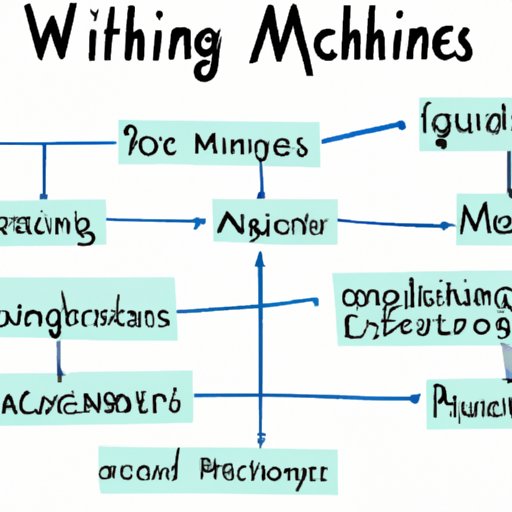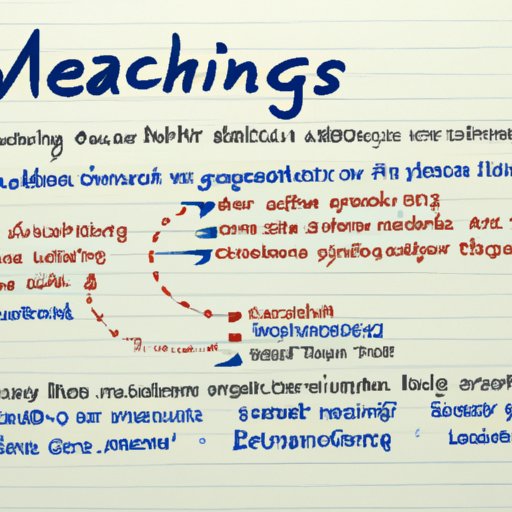Introduction
Writing mechanics refer to the rules that govern the conventions of written English. They include grammar, punctuation, spelling, and syntax, among other elements. The purpose of this article is to explore the role of mechanics in writing and provide a guide to mastering the fundamentals of good writing.
Exploring the Role of Mechanics in Writing
What are mechanics? In essence, mechanics are the rules of written language that help ensure clarity and accuracy in writing. They are used to convey ideas in an organized manner and make it easier for readers to comprehend the text.
Why are mechanics important? Good writing mechanics are essential for conveying ideas clearly and effectively. Poorly written texts can be difficult to understand and may lead to confusion or misunderstanding. Additionally, good writing mechanics demonstrate professionalism and competence in any given field.
How do mechanics affect writing? Mechanics play a critical role in writing by ensuring that the written message is accurate and easy to understand. By following proper grammar, punctuation, and spelling rules, writers can ensure that their writing is clear and concise. Additionally, mechanics can help make writing more interesting and engaging for readers.
The Essentials of Writing Mechanics
Grammar is one of the most important aspects of writing mechanics. It refers to the way words and phrases are combined to form sentences and paragraphs. Proper grammar usage ensures that the written message is clear and understandable.
Punctuation is another essential element of writing mechanics. It helps to emphasize certain points or separate ideas. Punctuation marks such as commas, periods, and question marks can help readers understand the intended meaning of a sentence.
Spelling is also an important part of writing mechanics. Incorrect spelling can lead to confusion and misunderstanding. Writers should take care to check their spelling before submitting any written work.
Syntax is the final essential element of writing mechanics. It refers to the order in which words and phrases are used in a sentence. Proper syntax helps to ensure that the written message is clear and concise.

Common Grammar and Punctuation Rules for Writers
Subject-verb agreement is one of the most important grammar rules for writers. It refers to the use of the correct verb form when referring to a subject. For example, “He is” instead of “He are”.
Sentence structure is another important grammar rule. Sentences should be clear and concise, with each word and phrase in its proper place. This will help readers understand the intended meaning of the sentence.
Comma usage is also essential for good writing. Commas are used to separate ideas and clarify meaning. They should be used sparingly and only when necessary.
Quotation marks are used to set off direct quotes and titles. They should be placed around the exact words that are being quoted, and should not be used to emphasize words or phrases.

An Overview of Writing Mechanics
Parts of speech are the building blocks of writing. These include nouns, verbs, adjectives, adverbs, and pronouns. Knowing how to properly use these parts of speech is essential for good writing.
Paragraphs are used to organize ideas and break up the text. Each paragraph should have a main point and supporting evidence. Paragraphs should be short and to the point.
Clarity and conciseness are two important aspects of writing mechanics. Sentences should be clear and easy to understand. Additionally, writers should strive to be as concise as possible in their writing.

Understanding the Basics of Writing Mechanics
There are several tips for improving grammar, punctuation, and spelling. Writers should read through their work carefully and look for any errors. A dictionary can also be useful for double-checking spelling. Additionally, writers should take the time to proofread and edit their work.
Understanding sentence structure is also essential for good writing. Sentences should be clear and concise, with each word and phrase in its proper place. Writers should also pay attention to the use of active and passive voice.
Knowing when to use commas is an important aspect of writing mechanics. Commas should be used to separate ideas and clarify meaning. However, they should not be overused, as this can lead to confusion.
A Guide to Writing Mechanics
Understanding the basics of mechanics is the first step to becoming a better writer. Writers should practice good writing habits and familiarize themselves with the rules of grammar, punctuation, and spelling. Seeking feedback from others can also help improve writing skills. Additionally, using a dictionary and other resources can be helpful for double-checking spelling and understanding unfamiliar words.
Mastering the fundamentals of writing mechanics requires dedication and practice. Writers should take the time to proofread and edit their work. Additionally, they should seek feedback from others to identify any areas of improvement. Finally, writers should stay up-to-date on writing mechanics by reading books and articles on the topic.
Conclusion
This article has explored the fundamentals of writing mechanics. It has explained what mechanics are and why they are important. Additionally, it has provided an overview of common grammar and punctuation rules for writers. Lastly, it has offered tips for improving grammar, punctuation, and spelling. By taking the time to learn and practice writing mechanics, writers can become better communicators and more proficient writers.
(Note: Is this article not meeting your expectations? Do you have knowledge or insights to share? Unlock new opportunities and expand your reach by joining our authors team. Click Registration to join us and share your expertise with our readers.)
